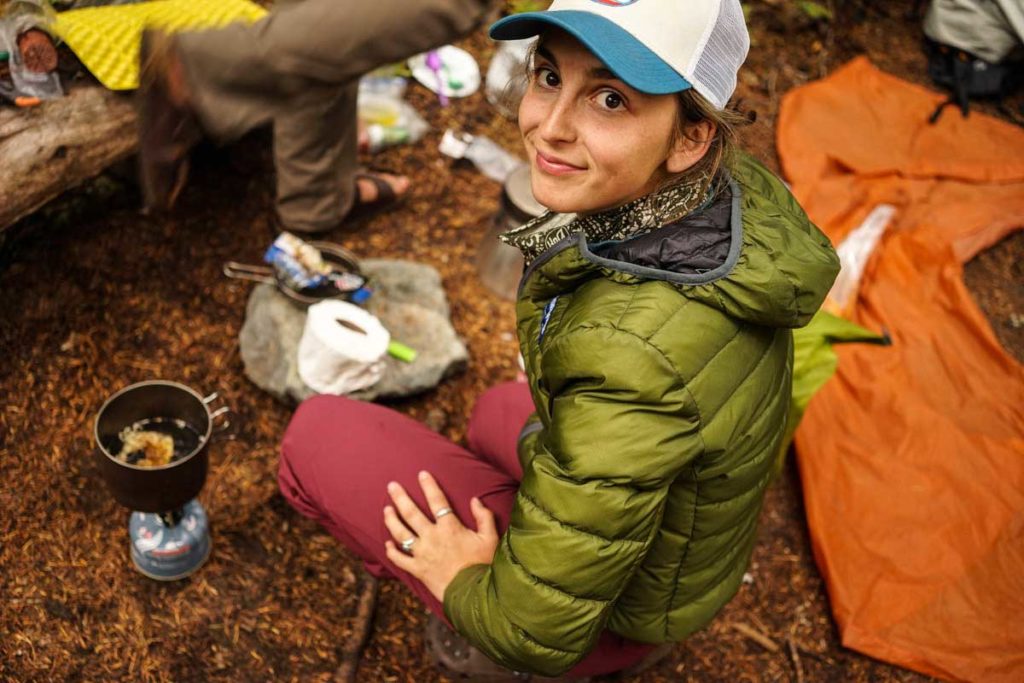In this interview, we sit down with Lindsey Elise, an avid outdoors enthusiast, writer, and self-proclaimed “backpacking fiend” from Tandem Trekking. Lindsey and her fiancé, Kyle, undertook the Appalachian Trail three years ago and have recently embarked on the Pacific Crest Trail. Our conversation delves into the psychological and practical aspects of thru hiking, exploring the highs and lows, the potential of the human body, and the transformative power of long-distance hikes.
Pushing Comfort Zones and Rediscovering the Best Self
Reflecting on the motivation for their upcoming Pacific Crest Trail (PCT) thru hike, Lindsey shares a journey of self-discovery. While initially considering the PCT as a natural progression from the Appalachian Trail (AT), she realized there’s more to it. The PCT, for her, is an opportunity to push beyond comfort zones, embracing constant challenges and living on the edge of societal norms. It’s a quest to recapture the best version of herself that she experienced during the AT, a journey to rediscover personal toughness, certainty, and jubilance.
Lessons Learned: From Practical Skills to Deeper Rhythms
Drawing from their Appalachian Trail experience, Lindsey outlines a plethora of lessons, ranging from practical hiking skills to profound interpersonal dynamics. Beyond mastering the art of foot care, setting up tents in rainstorms, and filtering water from unexpected sources, the deeper rhythms of the trail left an enduring impact. The AT taught them how to be exceptional partners, understanding each other’s needs and taking turns being the strong support when required.
Thru Hiking: An Addictive Pursuit
Delving into the addictive nature of thru hiking, Lindsey acknowledges the freedom that the trail offers. It’s a break from the routine of societal expectations, providing a unique opportunity to be spontaneous and free. The intense physical and emotional challenges create a cycle of misery and ecstasy, making the trail an addictive pursuit. Lindsey suggests that, in the true sense of the word, hikers become addicted to the trail, yearning for it even after completing a thru hike.
Anticipating Challenges: Mental and Physical
Discussing potential challenges on the PCT, Lindsey categorizes them into mental and physical aspects. Physically, they expect extreme weather conditions, dehydration, blisters, and overall discomfort. However, the mental challenges are deemed simpler – either thru hiking makes you happy, or it doesn’t. The ultimate mental challenge, for some, is choosing to keep going when faced with discomfort and uncertainties. Thru hiking becomes the ultimate test, revealing one’s toughness, resilience, and breaking points.
“Wild Effect” on the Pacific Crest Trail
Lindsey addresses the impact of Cheryl Strayed’s book “Wild” on the PCT, expressing mixed feelings. While acknowledging the positive outcomes for the Pacific Crest Trail Association (PCTA), she raises concerns about the potential negative effects. The popularity of the book has led to an influx of hikers, some unaware of trail ethics and regulations. Lindsey fears a repeat of the challenges seen on the AT – crowded trails and instances of negligence.
Trail Angels and Trail Magic
Exploring the unique culture of thru hiking, Lindsey introduces the concepts of trail angels and trail magic. Trail angels are individuals who extend kindness and support to thru hikers, providing shelter, food, and assistance. Trail magic, often stemming from trail angels, encompasses unexpected positive occurrences on the trail, such as good weather or finding essential items at the right time.
Training for a Long Thru Hike
Discussing the preparation for a long thru hike, Lindsey humorously suggests training involves eating burritos and binge-watching Netflix. While acknowledging the necessity of physical training, she emphasizes that nothing truly prepares you for the demands of a thru hike except walking with a heavy pack. Whether through gym workouts, hiking, or running, the key is to stay healthy and attuned to one’s body.
Reintegrating into Civilization
Lindsey describes the post-thru-hike experience as a form of culture shock, referred to in the hiking community as “trail blues.” The simple pleasures of daily life become extraordinary on the trail, and readjusting to the norms of civilization can be challenging. Yet, the addictive nature of thru hiking beckons, leading hikers to return to the woods in pursuit of the highs and lows that redefine their existence.
In conclusion, Lindsey Elise’s insights offer a glimpse into the world of thru hiking, where challenges, self-discovery, and a connection with nature intertwine to create a transformative journey. As she embarks on the Pacific Crest Trail, Lindsey invites fellow hikers to share in the experience, embracing the adventure and the unknown that lie ahead.

